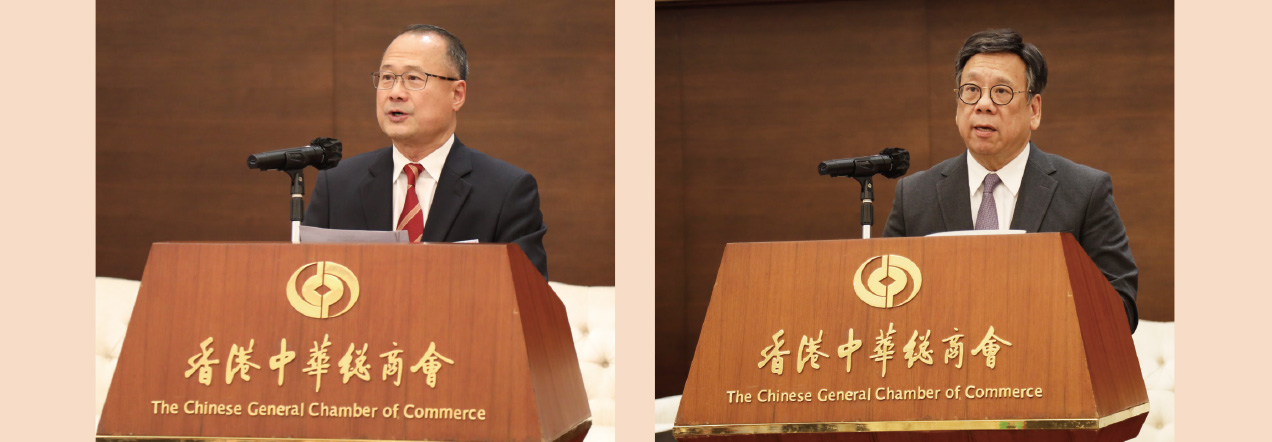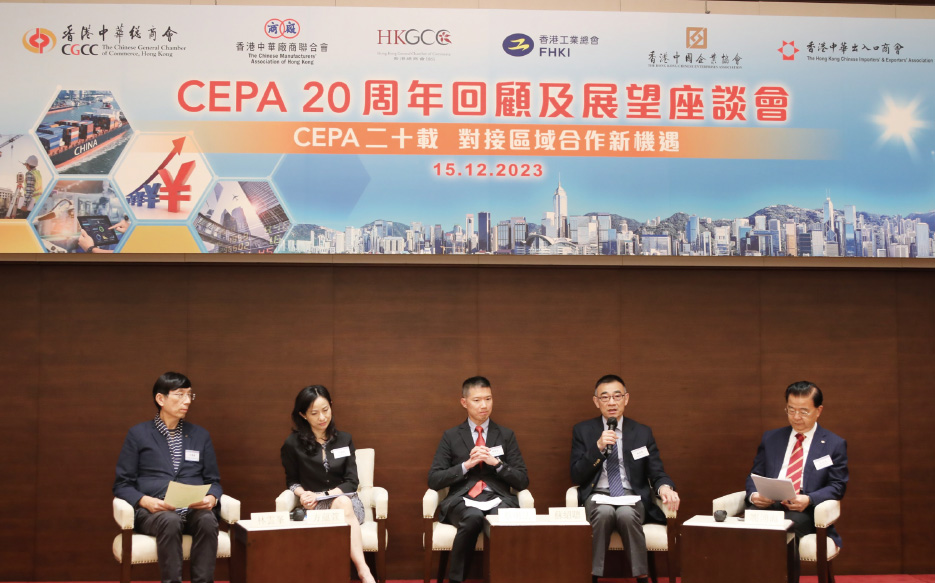
The Chamber held the forum with the Chinese Manufacturers’ Association of Hong Kong (CMA), the Hong Kong General Chamber of Commerce (HKGCC), the Federation of Hong Kong Industries (FHKI), the Hong Kong Chinese Enterprises Association (HKCEA) and the Hong Kong Chinese Importers’ & Exporters’ Association (HKCIEA). The forum was graced by the presence of Algernon Yau, Secretary for Commerce and Economic Development.
Jonathan Choi, the Chamber’s Chairman, delivered a welcome speech on behalf of the organizing chambers of commerce. He said that CEPA drives the Mainland and Hong Kong to achieve efficient and innovative cooperation in trade in services. This not only injects new momentum into Hong Kong’s economic development, but also plays a positive role in the country’s expansion of high-standard opening-up to the rest of the world. Amid changes in the new global political and economic landscape, Hong Kong’s business community must better grasp the CEPA opportunity.

Jonathan Choi Algernon Yau
Algernon Yau: CEPA is of great significance to Hong Kong’s development
Yau stressed that CEPA is still the free trade agreement that represents the Mainland’s highest standard of opening-up. Under the CEPA framework, the Mainland has basically liberalized trade in services with Hong Kong. Hong Kong professionals may acquire the corresponding Mainland’s professional qualifications through mutual recognition of qualifications or examinations, which gives Hong Kong companies and professionals a first-mover advantage. The zero-tariff preferential treatment also encourages the development of Hong Kong brands and high value-added products.
The HKSAR Government will continue seeking to improve the level of facilitation of trade in goods between the two places, actively push for cooperation in multiple fields such as investment, economy and technology, and further enrich the content of CEPA.

(from right) Herman Hu, Steve Chuang, Agnes Chan, Connie Wong, Allen Shi, Li Xiguang, Pu Kwan-kay
Building a platform for Hong Kong-Mainland economic interaction
Representatives from various chambers of commerce shared the results and benefits that CEPA has brought to Hong Kong’s economic and social development since its implementation. Connie Wong, the Chamber’s Vice-Chairman, said that CEPA not only opens up business opportunities in the Guangdong service market for Hong Kong’s business community, but also enables Mainland enterprises to promote industrial upgrading and transformation through Hong Kong, thus allowing Hong Kong to fully utilize its role as a testing ground.
Allen Shi, President of the CMA, stressed the need to think about how to leverage the CEPA advantage to promote our own industrial upgrading in the evolution of international industrial division of labour and supply chain systems. The HKSAR Government can work with the Shenzhen Government to jointly approach the Central Government for the establishment of a “customs buffer zone” and implement special facilitation that is “better than CEPA”.
Agnes Chan, Deputy Chairman of the HKGCC, agrees that CEPA has greatly lowered the threshold for Hong Kong companies and professionals to enter the Mainland market. It has also enhanced Hong Kong’s appeal to overseas companies, making Hong Kong a priority for multinational companies to expand their business in the Mainland and Asia.
Steve Chuang, Chairman of the FHKI, said that CEPA provides important support for the Hong Kong manufacturing sector and promotes innovation and technological upgrading of enterprises in both places. The HKSAR Government recently signed a cooperation agreement with the General Administration of Customs to facilitate customs clearance arrangements for Hong Kong food products to further ensure the safety of food exported from Hong Kong to the Mainland and promote trade facilitation.
Li Xiguang, Vice-Chairman of the HKCEA, said that CEPA provides strong support for interaction, information exchange and resource sharing between Mainland enterprises and Hong Kong businesses. Pui Kwan-kay, President of the HKCIEA, mentioned that CEPA will continue to play a role in the digital economy era. The HKCIEA also proposed the establishment of a Hong Kong e-commerce development alliance to encourage Hong Kong companies to register on Mainland platforms to expand the sales networks for Hong Kong brands.

(from right) Tse Yung-hoi, Thomas So, Cai Mingfa, Loretta Fong, Bernard Vincent Lim
Giving Hong Kong companies a boost to expand into Mainland market
The forum also invited representatives from several industry sectors to share their views. Cai Mingfa, Regional Director of South China Region of Bank of East Asia (China), said that Hong Kong’s financial institutions can more easily access the Mainland market through CEPA, providing enterprises and individuals with a wider range of investment options. The bank will actively explore the development of innovative green financial products and services.
Loretta Fong, former President of the Hong Kong Institute of Certified Public Accountants, said that under the CEPA framework, Hong Kong accountants can enjoy national treatment, obtain the highest CICPA business exemption, and apply for a provisional license to perform audit-related services in the Mainland. She is confident that the Hong Kong accounting industry can continue to play a role as an advocate.
Thomas So, Chairman of eBRAM International Online Dispute Resolution Centre, said that CEPA allows Hong Kong lawyers to participate in the Mainland’s professional examinations and relaxes restrictions on partnership and joint ventures, enabling Hong Kong to provide cross-border dispute resolution services. He looks to the industry strengthening cooperation with Mainland institutions to create more opportunities.
Bernard Vincent Lim, Principal of Architecture Design and Research Group (AD+RG), said that Hong Kong architects can enjoy mutual recognition of professional qualifications with the Mainland through CEPA. This is a major breakthrough for the industry to expand business in Qianhai. He looks to the HKSAR government enhancing ties with the Mainland to facilitate better development of the industry in the Greater Bay Area.
Clifton Ko, CEO of Springtime Stage Production, said that CEPA has led to a significant recovery in Hong Kong’s film and television industry. He hopes that through the Greater Bay Area market, Hong Kong’s film, TV and performing arts can integrate elements such as national education into the development of the film, TV and cultural industries.
Vivian Tang, Executive Director of Wai Yuen Tong Medicine, agrees that CEPA has greatly reduced business operating costs. She hopes that the traditional Chinese medicine industry will enjoy freer opening-up, support and facilitation measures in the Greater Bay Area, and assistance for tapping into the ASEAN and “Belt and Road” Initiative markets.
Priscilla Lau, Honorary Committee Member of the Chamber, stressed that CEPA has played a great role in the Mainland’s reform and opening-up and Hong Kong’s prosperity and development since its signing 20 years ago. She looks to the HKSAR Government continuing to enrich the content of CEPA and strive for the Mainland to further open-up the Greater Bay Area and even the entire territory to Hong Kong, thus helping Hong Kong companies to expand into the domestic market in the entire country.
The forum was held at the Chamber’s hall. Herman Hu and Tse Yung-hoi, Vice-Chairmen of the Chamber, served as the moderators for the two sessions featured in the forum, i.e., one where representatives of the chambers of commerce delivered their speeches and the other where industry representatives shared their views. Over 100 guests attended the event, including Maggie Wong, Director-General of Trade and Industry; Suo Li, Director of the General Affairs Group of the Commercial Office of the Economic Affairs Department of the LOCPG in the HKSAR; Charles Cheung, Vice-Chairman of the Chamber; Calvin Chan, Vice President the CMA; Anthony Lam, Executive Deputy Chairman of the FHKI; Jimmy Wong, Vice President of the HKCIEA, representatives from relevant departments of the HKSAR Government, and members of various chambers of commerce and corporate management representatives. (15/12)




